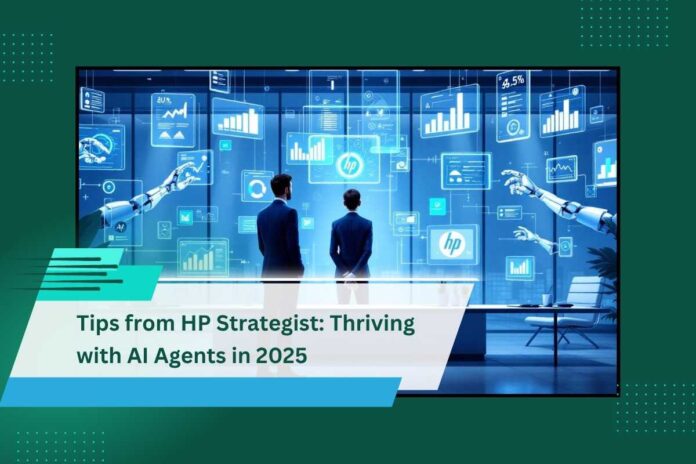As artificial intelligence continues to evolve, AI agents are emerging as transformative tools in the workplace. These autonomous systems are poised to revolutionize how businesses operate, offering enhanced productivity, efficiency, and innovation. Cihangir Kocak, a principal business and AI strategist at HP, provides valuable insights into harnessing the potential of AI agents to drive success in 2025 and beyond.
1. Comprehend the Capabilities of AI Agents
AI agents are not merely passive responders; they are active problem-solvers equipped with tools, memory, and defined goals. They can autonomously perform complex tasks, collaborate with other agents, and make decisions with minimal human input. According to Kocak, “Large language models act as the brains and AI agents as the hands, which means they can also act.” This evolution allows AI agents to handle multifaceted responsibilities, from managing emails and calendars to conducting market research and generating content.
2. Initiate Hands-On Experimentation
To effectively integrate AI agents into business operations, Kocak emphasizes the importance of experimentation. He suggests that organizations begin by exploring AI tools and platforms, such as those offered by Hugging Face, Salesforce, and Microsoft. These resources provide accessible avenues for understanding and implementing AI agents. By starting small and gradually expanding their use, businesses can identify areas where AI agents can add the most value and tailor their applications accordingly.
3. Foster Collaboration Among AI Agents
The true power of AI agents lies in their ability to collaborate seamlessly. In a business context, different agents can specialize in various tasks—one handling customer inquiries, another managing logistics, and yet another overseeing content creation. This collaborative approach enables organizations to streamline operations, reduce redundancies, and enhance overall efficiency. Kocak envisions a future where businesses deploy networks of AI agents working in harmony to achieve complex objectives.
4. Invest in AI Literacy and Workforce Training
As AI agents become integral to business processes, there is a growing need for a workforce proficient in AI technologies. Kocak advocates for investing in AI literacy programs and training initiatives to equip employees with the skills necessary to work effectively alongside AI agents. This investment not only enhances individual capabilities but also fosters a culture of innovation within the organization.
5. Implement Ethical Guidelines and Governance Structures
The deployment of AI agents raises ethical considerations related to data privacy, decision-making transparency, and accountability. Kocak advises organizations to establish clear ethical guidelines and governance structures to ensure that AI agents operate in alignment with organizational values and regulatory requirements. By proactively addressing these concerns, businesses can mitigate risks and build trust with stakeholders.
6. Monitor and Evaluate AI Agent Performance
Continuous monitoring and evaluation of AI agent performance are crucial to ensure they meet desired outcomes. Kocak recommends implementing performance metrics and feedback mechanisms to assess the effectiveness of AI agents in real-time. Regular evaluations allow organizations to make necessary adjustments, optimize AI agent functionalities, and ensure alignment with evolving business objectives.
7. Embrace a Culture of Innovation and Adaptability
The rapid advancement of AI technologies necessitates a culture of innovation and adaptability within organizations. Kocak emphasizes the importance of fostering an environment where experimentation is encouraged, and failures are viewed as learning opportunities. By embracing change and staying open to new ideas, businesses can remain competitive and agile in an increasingly AI-driven landscape.
8. Leverage AI Agents for Strategic Decision-Making
AI agents can analyze vast amounts of data to provide insights that inform strategic decision-making. Kocak highlights the potential of AI agents to assist in market analysis, trend forecasting, and risk assessment. By integrating AI-driven insights into decision-making processes, organizations can make more informed, data-backed choices that drive long-term success.
9. Ensure Seamless Integration with Existing Systems
For AI agents to be effective, they must integrate seamlessly with existing business systems and workflows. Kocak advises organizations to prioritize interoperability when selecting AI tools and platforms. Ensuring compatibility with current infrastructure minimizes disruptions and accelerates the adoption process, allowing businesses to realize the benefits of AI agents more swiftly.
10. Stay Informed About Emerging AI Trends
The field of AI is rapidly evolving, with new developments and innovations emerging regularly. Kocak underscores the importance of staying informed about the latest AI trends, tools, and best practices. Engaging with industry conferences, webinars, and publications can provide valuable insights and help organizations stay ahead of the curve in leveraging AI agents effectively.
By following these strategies, businesses can harness the full potential of AI agents, transforming their operations and positioning themselves for success in the AI-driven future. As Kocak aptly states, “We are going to a future where everyone will have an AI agent as an assistant.” Embracing this future today can lead to significant advantages in the competitive business landscape.


